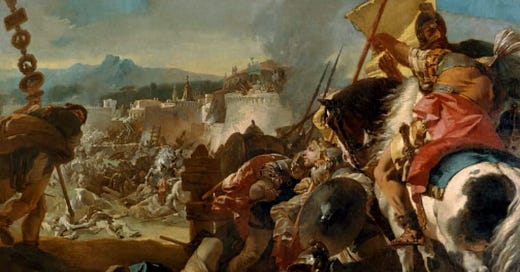If you are looking for the beginning of the study for The Young Carthaginian then you can go HERE for a brief introduction. At the bottom of the introduction you will find the links to each section of the study guide as it becomes available. If you would like to see the growing list of book studies available for free on this site you can go HERE. Enjoy!
Grammar Questions: (The Information of the Text)
How is the weather described where the army is camped at the beginning of the story?
What are some of the countries (give at least three) which Henty says make up the Carthaginian military force?
When did boys begin their military training in Carthage and what were they taught to endure?
What did Malchus’ father tell him would make the men he commanded “follow you all the more cheerfully”?
What concerns were troubling Giscon’s mind while the other young men were thinking about the upcoming hunt?
What does Hamilcar “have hopes, great hopes” for in regard to Hannibal?
What changed which caused the Carthaginian government to become corrupt?
What was the reason for the expedition which was being led by Hamilcar, some “twenty days’ march from Carthage”?
What was the plan to drive the lions into the open for the hunt?
Logic Questions: (Interpreting, Comparing/Contrasting, Reasoning)
Why does Hamilcar tell Malchus that it is necessary for them to show that they are “superior to the common herd”?
Hamilcar tells his son, “impatience is a fault”. Why is impatience a vice?
Who is “the committee of five”?
What does Hamilcar compare the “Augean stable” to which Hercules cleaned out?
Rhetoric Questions: (The Analysis of Ideas in the Text)
Henty mentions several forms of government including Republics, Monarchies, and Aristocracies. What are the differences between these forms of government and which, of these, do you think is the best? Explain your answer.
Of the four cardinal virtues, Prudence, Justice, Fortitude, and Temperance, where do you see signs of these being taught as important in this chapter?
Theological Analysis: (Sola Scriptura)
Proverbs 16:32 says, “Whoever is slow to anger is better than the mighty, and he who rules his spirit than he who takes a city.” How does this align with the things Malchus’ father seems to be constantly teaching him?
Literary Cross-Reference:
The story of Hercules and the Augean stable is retold in Tales of Greek Heroes by Roger Lancelyn Green.



